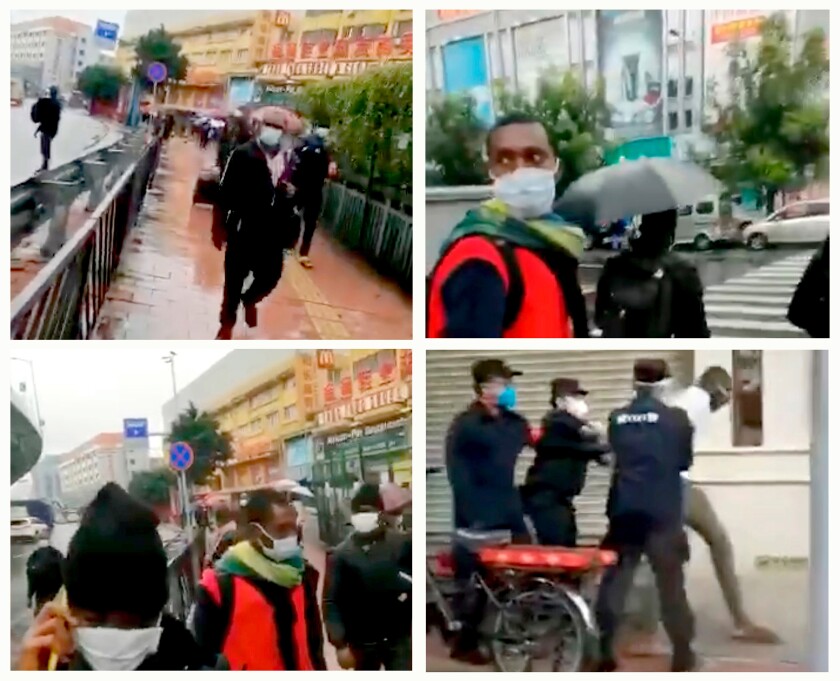- Joined
- Jul 10, 2008
- Messages
- 66,377
- Points
- 113
‘No blacks’: Evicted, harassed and targeted in China for their race amid coronavirus

In images from video, displaced Africans roam Guangzhou, China, on April 7, unable to find a hotel that will accept them. Eventually, police take some to a station.
(Video taken in Guangzhou)
By Alice SuBeijing Bureau Chief
April 16, 2020 12:09 PM PT
BEIJING —
Elo started cooking as soon as he heard about the boys on the street. The Nigerian trader opened an informal restaurant in Foshan, a manufacturing city half an hour’s train ride from Guangzhou, where dozens of Africans became homeless last week.
Evictions from homes and apartments started when Guangzhou authorities announced that five Nigerians had tested positive for COVID-19. Within days, a campaign was launched to test and track all Africans in the port city.
The sudden and sweeping move was consistent with China’s response to the coronavirus. But it was propelled by a troubling logic that targeted people based on race rather than their contact history. The measure ignited a diplomatic outcry and a crisis on Guangzhou’s streets.
Some of the displaced Africans were longtime residents forced from their homes. Others were businessmen who’d completed 14-day quarantines, but then couldn’t find any hotels that would accept them.
They roamed the streets in the rain and slept under highway overpasses, huddled on the pavement in face masks. They filmed videos of police shouting at them, pressing young men to a wall, and of signs posted in apartment buildings and restaurants — including McDonald’s — saying: “No blacks.”

In images from video, displaced Africans roam Guangzhou, China, on April 7, unable to find a hotel that will accept them. Eventually, police take some to a station.
(Video taken in Guangzhou)
By Alice SuBeijing Bureau Chief
April 16, 2020 12:09 PM PT
BEIJING —
Elo started cooking as soon as he heard about the boys on the street. The Nigerian trader opened an informal restaurant in Foshan, a manufacturing city half an hour’s train ride from Guangzhou, where dozens of Africans became homeless last week.
Evictions from homes and apartments started when Guangzhou authorities announced that five Nigerians had tested positive for COVID-19. Within days, a campaign was launched to test and track all Africans in the port city.
The sudden and sweeping move was consistent with China’s response to the coronavirus. But it was propelled by a troubling logic that targeted people based on race rather than their contact history. The measure ignited a diplomatic outcry and a crisis on Guangzhou’s streets.
Some of the displaced Africans were longtime residents forced from their homes. Others were businessmen who’d completed 14-day quarantines, but then couldn’t find any hotels that would accept them.
They roamed the streets in the rain and slept under highway overpasses, huddled on the pavement in face masks. They filmed videos of police shouting at them, pressing young men to a wall, and of signs posted in apartment buildings and restaurants — including McDonald’s — saying: “No blacks.”


